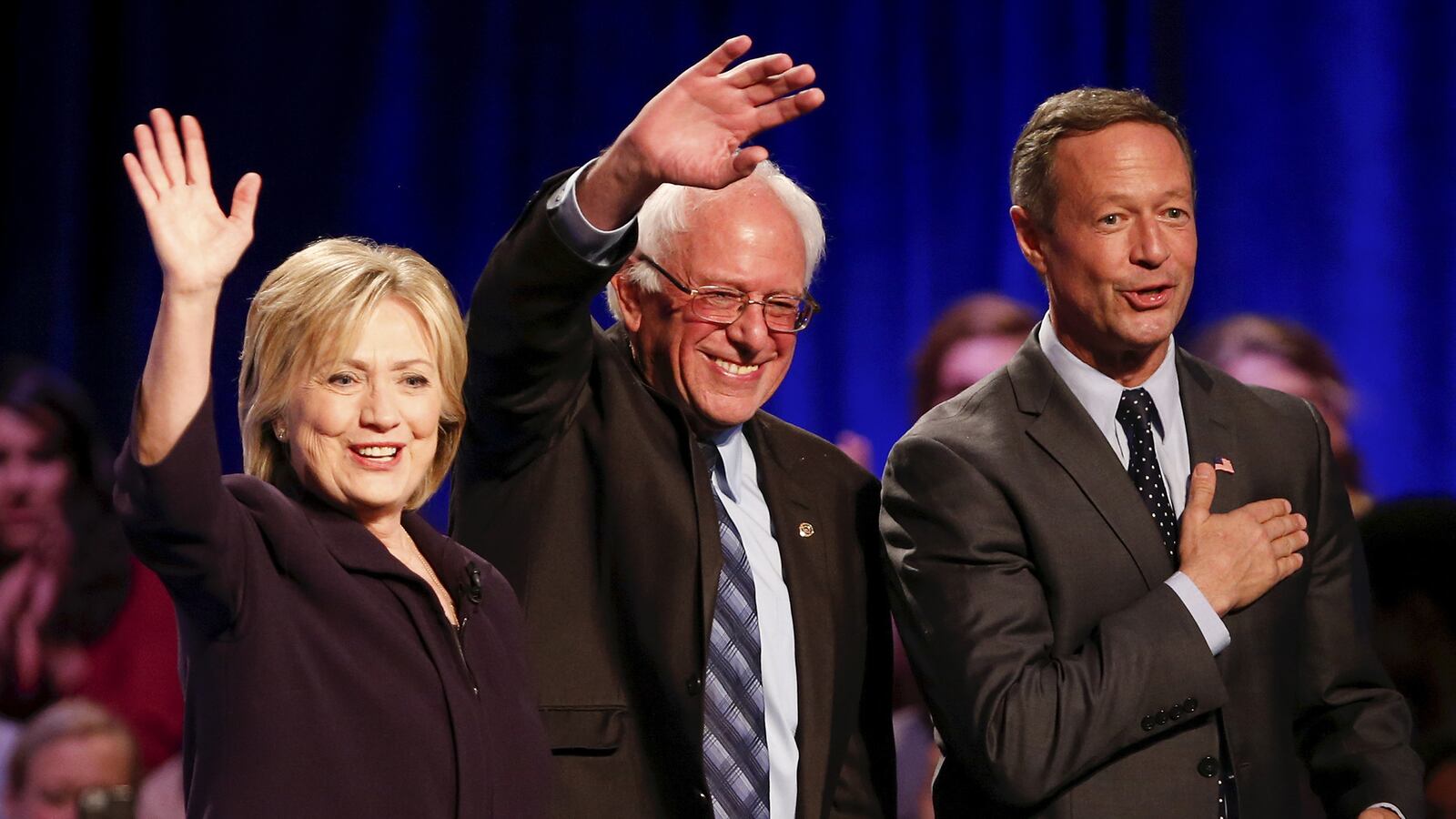From the sound of the Democratic presidential candidates, you’d think every president gets a magic wand upon entering the Oval Office. When it comes to gun control, they’re actually only given a headache.
This weekend the three Democratic candidates pounced on each other over their gun-control positions. Bernie Sanders was put on the defensive (again) for voting in the past to give gun makers immunity. Clinton continues to paint herself as the most bullish on the issue.
She gets cheers on the stump when she vaguely promises to use executive authority to tighten the nation’s gun laws, but President Obama already signed 23 executive orders on gun control back in 2013.
Conservatives make a good point when they raise doubts that any president can go further than Obama has gone without the support of Congress. And no Democratic presidential candidate has offered an answer to a simple equation: To pass anything they need 60 supporters in the Senate and another 218 supporters in the House.
To regain control of Congress, Democrats have two options: Capture Red seats by running pro-gun Democrats—as they did when they were swept back into power in 2006—or change the debate nationwide by making gun-control measures palatable to gun-toting voters.
Even if they succeed on either count, the liberal wing of the Democratic Party likely won’t be able to deliver on even modest gun-control proposals for years, possibly even decades. But that isn’t stopping them from using the issue as a rallying cry to excite the base and as a litmus test for their fellow Democrats.
After their effort to bring back the gun control debate in 2013, following the tragic slaying of 26 school children and educators in Newtown, Connecticut, utterly failed, Democrats are now trying to pick much lower hanging fruit.
This fall, party leaders paraded some two dozen of their senators onto the Capitol steps to push a myriad of gun-control proposals—like expanding background checks and keeping guns out of the hands of people under a restraining order—that have been floating around their caucus for some time.
Even Bernie Sanders was there.
He demurred when he was asked afterwards by The Daily Beast if he thinks the mood of the country has changed on guns. “I don’t know if it has or not,” he said. “I do believe that it is imperative that we do everything that we can to make sure guns are not in the hands of people who should not have that, and I would hope that on that approach there would be a widespread consensus. I do believe people are getting sick and tired of seeing these horrific events. So I hope we can make some progress.”
Moderate Democratic Sen. Joe Manchin (WV) also took part in the event, but he bemoaned the Democrat-only gathering. “Everything here is politicized,” he admitted on the Capitol steps after his colleagues had left. “Everything in Washington is politicized.”
The open secret on Capitol Hill is that Democrats need more “Manchins” to pass any gun-control bill. In 2013, Manchin teamed with vulnerable Pennsylvania Republican Sen. Pat Toomey to push a modest gun bill that required criminal background checks on private gun sales (while easing some restrictions on veterans, like the one who slaughtered 12 people at Washington’s Navy Yard).
Their bill fell six votes shy of overcoming a Republican filibuster, but Manchin maintains Democrats need to keep the focus on it if they want a policy change and not just a political issue.
“If you’re going to do something, our bill was the most realistic approach,” he said. “Treating gun owners as law-abiding citizens and not thinking a person who owns a gun is a criminal. So if they want to take that approach and look at it pragmatically, as we did in our bill, I’d be happy to look and see what they come up with. But you got to get more votes.”
Even if Democrats are able to keep the White House and recapture the Senate this cycle, they’re unlikely to regain control of the House for years to come. And remember how they won back the House in 2006? By running pro-gun Democrats.
Then-Congressman Rahm Emanuel (D-IL) orchestrated that 2006 takeover by rejecting liberals’ calls to run only like-minded progressives. It worked. Even the National Rifle Association took notice. A few days after the election, their chief lobbyist sent this message to disheartened members:
“Importantly, however, on a day that saw an electorate expressing dissatisfaction over such things as conduct of the war, political corruption and competency to govern, Americans cast their votes for pro-gun candidates from both parties,” penned Chris W. Cox, the executive director of the NRA’s Institute for Legal Action.
Under then-Speaker Nancy Pelosi gun control (like immigration reform) wasn’t a top priority for Democrats and she shielded her moderate members from casting tough votes on gun legislation.
But in the wake of the massacre at Virginia Tech—the nation’s deadliest mass shooting to date—the House was able to pass a bill aimed at expanding the federal database used to weed out criminals and the mentally ill people who try to buy guns. The NRA endorsed it and President George W. Bush signed it into law.
Yet the mass shootings persist.
And the electoral map hasn’t really changed, except for getting even redder. But the impatience among Democrats is growing, as evidenced by President Obama’s remarks after the mass shooting at Umpqua Community College in Roseburg, Oregon.
“Well, this is something we should politicize,” a visibly frustrated Obama told reporters. “It is relevant to our common life together, to the body politic.” Obama’s not alone in his frustration. Democrats are now trying to change the gun debate nationwide, but they know it’s an uphill battle.
“This issue has to come from the bottom up, not the top down,” said Rep. Steve Israel (NY), the former head of the Democratic Congressional Campaign Committee. “In competitive districts around the country, if you can get a grass-roots response, that can change the political complexion and lead to meaningful gun safety measures.”
While not quite “grass-roots,” former NYC Mayor Michael Bloomberg is promising to spend $50 million this cycle to combat spending by the NRA (who didn’t respond to requests for a comment on this story) and other pro-gun groups. Former Democratic Rep. Gabby Giffords—who was nearly killed in 2011 by a gunman at a meet-and-greet with voters in Arizona—launched a new gun-control group called Women’s Coalition for Common Sense.
While Democrats are trying to ignite an anti-gun revolution, they still have to wrestle with their math problem.
“Republicans can win the House, basically, by exclusively winning districts that Mitt Romney won. The Democrats can’t do that. That explains why the Democrats [are] going to need more moderate members than the Republicans,” said Kyle Kondik, who tracks campaigns nationwide for the University of Virginia Center for Politics. “And that’s true of issues like gun control for those candidates.”






